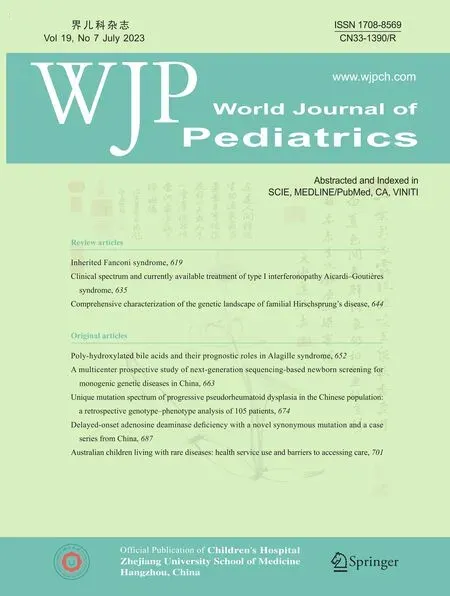Incidence and severity of pediatric appendicitis during the COVID-19 pandemic
Paula Rosanna Quaglietta · Reto M.Baertschiger
We read the article by del Giorgio et al.in the March 2023 issue ofWorld Journal of Pediatricswith great interest [1].The authors evaluated the incidence of pediatric appendicitis at their institutions during the first year of the pandemic compared to a four-year control period.They found an increased incidence of appendicitis but did not find differences between study groups for length of stay,age and sex distributions,and proportion of complicated appendicitis.
The authors concluded that delay in care for pediatric acute conditions was not a key factor in outcomes during the pandemic.Given their data,we support this conclusion for their institutions.However,we caution the authors,as they draw conclusions about all of Canada,but both institutions involved in this study are located in Montreal.We conducted a similar study evaluating pediatric appendicitis at our institution in Toronto,Ontario,and found different results,as compared in Table 1 [2].We similarly found significant increases in acute appendicitis incidence and no significant difference in length of stay;however,our results suggest worsened outcomes during the pandemic,demonstrated through an increased rate of complicated/perforated appendicitis (from 28.3% to 38.8%).The pre-pandemic group in del Giorgio et al.’s study had an increased perforation rate (37.7%) compared to ours,although within the typically reported rates (20%-45%) for appendicitis [3,4].We cannot explain these differences,but they may be of clinical significance.We evaluated additional metrics,including the duration of antibiotic treatment,surgery length and readmission rate,supporting our observed worsened outcomes during the pandemic.
Personal communications with other pediatric hospitals in Ontario revealed similar increases in volume,with one institution also observing increased complicated/perforated appendicitis rates.In Canada,healthcare is under provincial jurisdiction;thus,provinces experienced variable coronavirus disease 2019 (COVID-19) policies mandated by provincial governments (school lockdowns,restaurants,worship centers,healthcare policy for urgent versus non-urgent care,etc.),in addition to federally mandated policies (international travel,land-border closures,testing policies,quarantines,etc.),that may have impacted healthcare,including pediatric acute appendicitis.Given this information,we are unsure whether del Giorgio et al.’s findings can be generalized to all of Canada given that both institutions are located within Montreal.
Overall,this is an important article to understand the impacts of the COVID-19 pandemic on broader healthcare.The authors should be cautious in generalizing to encompass the entire nation when only studying one region,especially knowing that Canada is a federalist state with different healthcare systems and provincial government-based COVID-19 pandemic policies.

Conflict of interestNo financial or non-financial benefits have been received or will be received from any party related directly or indirectly to the subject of this article.The authors have no conflict of interest to declare.
 World Journal of Pediatrics2023年7期
World Journal of Pediatrics2023年7期
- World Journal of Pediatrics的其它文章
- Editors
- Information for Readers
- Instructions for Authors
- Response to “Incidence and severity of pediatric appendicitis during the COVID-19 pandemic”
- Australian children living with rare diseases: health service use and barriers to accessing care
- Delayed-onset adenosine deaminase deficiency with a novel synonymous mutation and a case series from China
